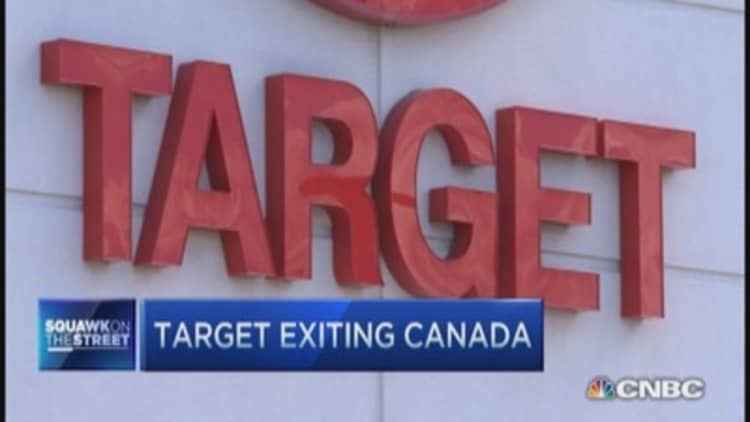
It's going to cost a big chunk of change, but less than two years after opening its first store in Canada, Target has decided to close the profit-sucking operation there.
While the news will initially be a blow to the big-box retailer—which through third quarter 2014 had lost $2.1 billion on the venture—it should deliver a long-term benefit to the company's U.S. business, said Belus Capital Advisors analyst Brian Sozzi.
Sozzi said he expects Target to use its savings to repurchase shares (something it hasn't done since 2011), lay the groundwork to open more of its urban stores and create a store of the future for its full-size locations.
"The news comes earlier than what I thought ... [but] overall it's a great decision," Sozzi said.
Read MoreRetailers are closing up shop. Here's why...
First on Target's to-do list should be to repurchase shares—even as early as this year, Sozzi said. This way, the retailer could get a boost as its other investments start to pay off, he said.
Then Target should focus on fine-tuning its real estate and store experience, Sozzi said. That includes opening more small-format city locations—specifically, its TargetExpress and CityTarget stores—which "has gotten lost in the shuffle" as it tried to right the ship in Canada.
The retailer currently has one TargetExpress location, which is roughly 20,000 square feet, in Minneapolis, and plans to open five more in 2015. It has eight CityTarget stores, which are approximately 80,000 to 125,000 square feet, with plans to open one in Boston in 2015 and one in Brooklyn in 2016.
"We're emphasizing smaller, more flexible formats to reach guests in large urban areas like San Francisco, LA, DC, Boston, Philadelphia and Minneapolis, where available real estate has challenged growth in the past," Target spokeswoman Kristen Emmons said in November.
Read MoreTarget apologizes to 'disappointed' Canadian shoppers
Sozzi said Target also needs to reinvent its big-box stores, including upgrading its fixtures, using more mannequins, and reworking its electronics department to close its gap with Best Buy and Wal-Mart.

He noted the company has already started making progress on these full-size stores, including the introduction of mannequins late last year.
Sozzi said he also expects the company to continue to "prune" its full-size store base by announcing plans to close five to 10 locations in its February earnings release.
In November, Target announced that it will close 11 locations as of Feb. 1.
That would be in addition to the Canadian exit. Target Canada has 133 stores and employs about 17,600 people. The company expects to report about $5.4 billion of pretax losses on discontinued operations in the fourth quarter, and about $275 million of pretax losses on discontinued operations in 2015.
Target's expansion into Canada was plagued with missteps from the get-go. It had trouble keeping products in stock, and customers frequently complained that when they were in-stock, they were too expensive. Some experts said its acquisition of discount retailer Zellers' stores was also a setback, as they didn't follow Target's typical store layout, which is known as a racetrack format.
Read MoreWhat Nordstrom can learn from Target's foray into Canada
Target also faced stiff competition from discounters Wal-Mart and Costco, which already had a strong presence in Canada. Perhaps most importantly, analysts said, the retailer simply opened too many stores too fast.
"We believe Target's decision to exit Canada after less than two years of store operations is an admission that it has failed in its attempt to enter a new market," Moody's Vice President Charlie O'Shea said in a note Thursday. "It is clear that the early flaws in Target's strategy to simultaneously open stores while building out or developing its supply-chain became insurmountable."
In a news release, CEO Brian Cornell, who inherited the Canadian problem when he was named CEO in July, said that after "careful consideration of the implications of all options, we were unable to find a realistic scenario that would get Target Canada to profitability until at least 2021."
Target will hold a call with investors Thursday after the conclusion of a court hearing.
"We view this as a major 'weight off the shoulders' of the company … that will allow the company to focus on executing the already-in-progress turnaround in the United States," said Wells Fargo analyst Matt Nemer. "It is also an indication of Cornell's leadership style, that there are no 'sacred cows' and he is willing to make tough decisions that support shareholder value."


